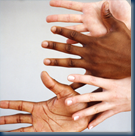 There - did I get you to click on and read through my post? Haha.
There - did I get you to click on and read through my post? Haha.
I did this post as part of a discussion board assignment for my teaching credential program and figured I’d put it up here as well for your perusal.
Teacher Performance Expectation F: Developing as a Professional Educator - is important. Two of its subpoints are:
12.2 "Candidates are aware of their own personal values and biases and recognize ways in which these values and biases affect the teaching and learning of students.
12.3 "Candidates resist racism and acts of intolerance."
(Taken from http://pact.gse.uci.edu/tpe/)
These are important elements of becoming a great teacher, and they're related to a lot of what is mentioned in Johnson, et. al (2008) on page 96 under the heading "Ethnocentrism."
Johnson condemns ethnocentrism as the belief that your way of life is superior to others (2008, p. 96). He then condemns the beliefs and cultural values of some religious groups before misrepresenting them. Those religious people that believe the homosexual lifestyle is wrong are said to "not tolerate alternate beliefs" and "believe that their cultural values and lifestyle are the only correct ones" (Johnson, 2008, p. 96). Unfortunately for Johnson his declaration that ethnocentrism is wrong and that these religious people are incorrect is itself an ethnocentric notion. In Johnson's world he has no more right to criticize that (misrepresented) religious point of view than he says they have the right to consider the homosexual lifestyle incorrect.
To say they "do not tolerate alternate beliefs" is a misrepresentation, unless he is talking about those groups who perpetrate violence on others. Simply believing someone else is wrong is not an example of intolerance or ethnocentrism - it's an example of disagreement. Using Johnson's own definition of tolerance and ethnocentrism, he is an intolerant ethnocentrist.
I am not saying this because I don't believe ethnocentrism is a problem. I believe it is. Too many people (including teachers) consider their own point of view superior to others, and think any who disagree with them are fools. This point of view is not limited to religious people or Democrats or Republicans or Americans or Europeans; it is part of the human experience. Being aware of our own ethnocentric tendencies and taking care not to unfairly discriminate against or judge others is essential. It's important for a History teacher to be careful how they discuss/teach/treat the groups in their curriculum. It is also important, I think, to teach students that extreme cultural relativism (the point of view Johnson seems to be promoting) and extreme ethnocentrism are both problematic.
Teachers must all be aware of the perspectives they have and how it influences them and what they are teaching. I agree with Johnson when he says that all teachers "must confront their own ethnocentrism" (2008, p. 96). We must teach the differences between groups and empower students to make decisions with regard to what they want to accept, condemn, or praise. I don't want to produce students that are so enlightened and forward-thinking that they cannot find fault in anything in any culture.
A culture that thinks it is okay to put people into slavery is worthy of being condemned on that point. A culture that tries to exterminate an ethnic group is, I can confidently say, worthy of criticism and I am fine with referring to others cultures as superior in that regard. A culture that mutilates girls and women is worthy of being considered faulty on that point.
At the same time we must not paint every person in such a culture as an inferior person - they are a person in a culture with some messed up ideas. Why do they believe the way they do? They were likely socialized to believe it? How can we work toward a society where people are not socialized into bigotry or hatred? These questions cannot be asked from a point of view totally free from ethnocentrism. I know the ideas from these cultures are "messed up" from my point of view - but if it makes me ethnocentrist to condemn slavery, genocide, and the mutilation and forced servitude of women - I'm cool with that.
It's important for teachers to help students have the ability to make these kind of distinctions. In order for a teacher to do that they must be aware of their own prejudices and ethnocentric tendencies, and be very aware of how they're communicating with their students. And even if a culture is worthy of some kind of criticism - simply criticizing it and leaving it at that is not sufficient. The teacher should engage in the questions I mentioned above and more - help students think for themselves through the issues and reach their own conclusions. I think this is a worthy goal for any teacher.
No comments:
Post a Comment